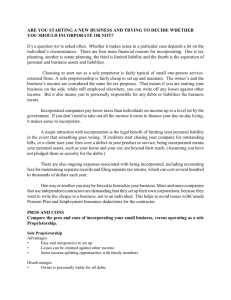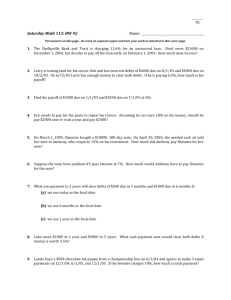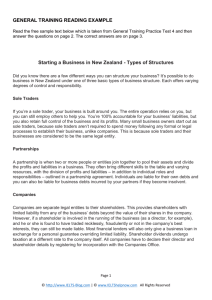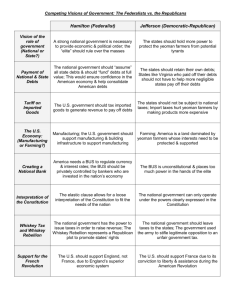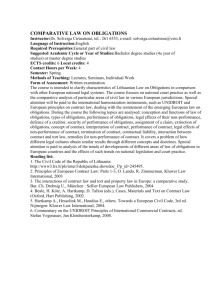Partnership Law: Types, Liabilities, & Dissolution
advertisement
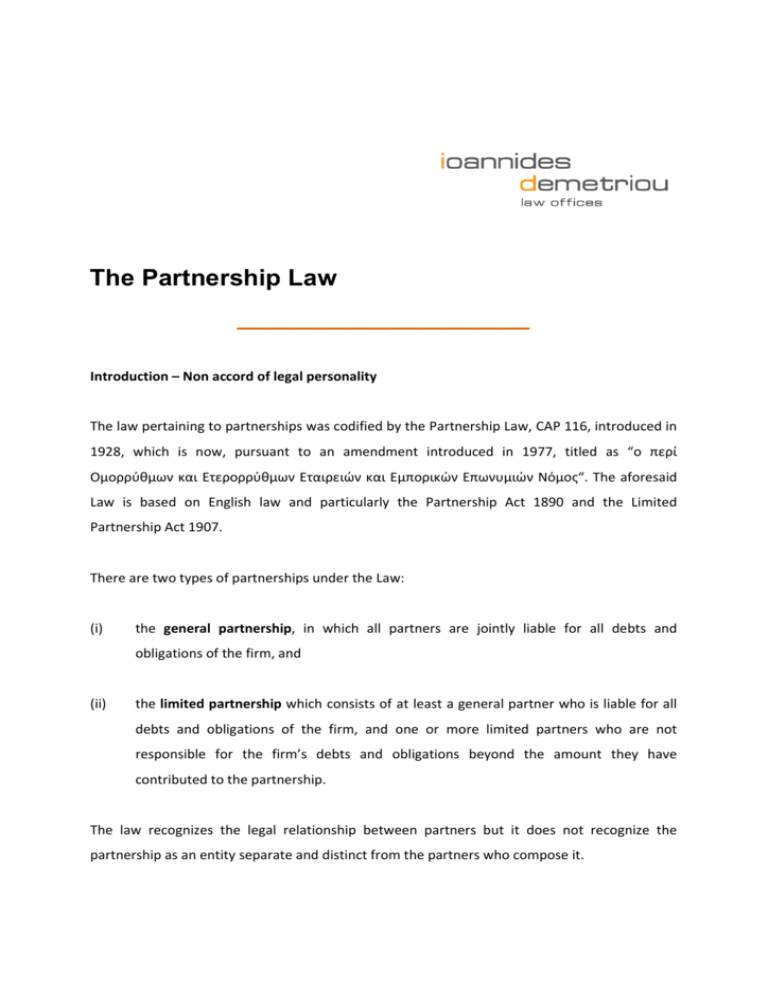
The Partnership Law _____________________ Introduction – Non accord of legal personality The law pertaining to partnerships was codified by the Partnership Law, CAP 116, introduced in 1928, which is now, pursuant to an amendment introduced in 1977, titled as “ο περί Ομορρύθμων και Ετερορρύθμων Εταιρειών και Εμπορικών Επωνυμιών Νόμος“. The aforesaid Law is based on English law and particularly the Partnership Act 1890 and the Limited Partnership Act 1907. There are two types of partnerships under the Law: (i) the general partnership, in which all partners are jointly liable for all debts and obligations of the firm, and (ii) the limited partnership which consists of at least a general partner who is liable for all debts and obligations of the firm, and one or more limited partners who are not responsible for the firm’s debts and obligations beyond the amount they have contributed to the partnership. The law recognizes the legal relationship between partners but it does not recognize the partnership as an entity separate and distinct from the partners who compose it. This feature is central to the law of partnerships and is of paramount importance. The consequences of the non accord of legal personality to the partnership are far reaching and cover the entire range of activities of a partnership. In this context, the functioning of a partnership is sharply distinguished from the activities of an ordinary company registered under the Companies Law, CAP 113, and indeed of any other corporate entity. The acts of the partnership are nothing more and nothing less than acts of the partners in their personal capacity. Whenever reference is made to a “firm” in the nature of a partnership the reference is to the partners (natural persons or legal entities) composing the firm. The commercial view of partnership treats a firm in much the same way as a company, i.e. as an entity distinct from its members and with independent rights and obligations. Consistently with this perceived status of the partnership as a separate entity, there is a tendency to regard a firm’s rights and obligations as unaffected by any change in its membership. The legal view of a partnership is different. The law ignores the firm and looks to the partners composing it. What is called the property of the firm is the partners’ property and what are called the firm’s debts and liabilities are the partners’ debts and liabilities. As a matter of law, a partner may be the debtor or creditor of his co‐partners but he cannot be either debtor or creditor of a firm of which he is a member. Likewise a partnership cannot employ a partner, for no person can employ himself. The dual capacity in which a partner acts, i.e. both as principal and agent, is central to an understanding of the law of partnerships. Partners, as principals, are bound by what they do themselves and by what their co‐partners do on behalf of the firm, as long as they keep within the limits of their authority. Partners, as agents, bind their co‐partners by what they do for the firm. Conditions of existence of a partnership The “partnership” is defined in s.1 of the Law which provides that “partnership is the relation which subsists between persons carrying on business with a view of profit”. A partnership is said to exist when three conditions are satisfied. There must be: (i) a business, (ii) which is carried on by two or more persons, (iii) with a view of profit. (i) Business Under s.2 of the Law “business includes every trade, occupation or profession”. Virtually any activity or venture of a commercial nature, including a “one off” trading venture, will be regarded as a business within the meaning of the law. It is not necessary that such activity be a trading or commercial one as it is known in the ordinary common language. Professionals like lawyers and accountants, when they establish a relationship for jointly carrying on their profession, will be regarded as having a partnership. The mere fact that a particular activity is profitable will not of itself turn it into a business within the meaning of the law; for example joint ownership of property does not of itself qualify as a business. Whether a business within the meaning of the law exists will depend on the specific circumstances. (ii) Two or more persons These may be natural persons or corporate entities. The Partnership Law does not provide for any maximum number of partners. There exists, however, such a limitation under s.370 of the Companies Law, which provides that no association consisting of more than twenty persons shall be formed for carrying on any business unless it is registered as a company pursuant to CAP 113 or is formed pursuant to some other law. It is therefore illegal to create a partnership with more than twenty persons although this restriction does not apply to professional partnerships, such as lawyers and accountants. (iii) Profit Profit means the net amount remaining after paying out of the revenue of a business all the expenses incurred in obtaining such revenue. Sharing of losses is not necessarily an element prerequisite to the conclusion of the existence of a partnership. The mere fact that somebody is remunerated for his services by a share in the profits of a business does not turn him into a partner. Liabilities Subject to the particular provisions which apply in relation to limited partnerships, every partner is the general agent of the partnership for carrying on its business in the ordinary way. The firm is responsible for whatever is done by any of the partners when acting for the firm within the limits of the authority conferred by the nature of the business it carries on. Even if there are limits as between the partners with regard to the authority of each partner, third parties who are not aware of those limits are entitled to assume that each partner is empowered to do for the firm all such acts which are necessary for its business, in the way in which the business is ordinarily carried on by other people. Every partner in the firm is liable jointly with the other partners for all debts and obligations of the firm incurred while he is a partner, provided that they relate to matters for which the partner, through the acts of whom the liability or debts have arisen, is authorized to act for the firm as aforesaid. The firm is also liable for wrongful acts of a partner acting in the ordinary course of the business of the firm. A person who holds himself out as a partner of a firm or knowingly suffers himself to be represented as a partner is liable as a partner. A partner who retires from a partnership is liable for the firm’s debts and obligations incurred prior to the date on which he ceased to be a partner and the liability of an outgoing partner for future debts and obligations of the firm ceases once his retirement has been publicly notified. Similarly a new partner in an existing partnership is not liable for the firm’s liabilities and obligations incurred prior to the date of his admission, unless, of course, he has agreed otherwise. Duration/Dissolution The duration of a partnership depends on the express or implied agreement between the partners. Therefore a partnership is liable to be dissolved pursuant to the provisions of the partnership agreement. A partnership entered into far an indefinite period may be dissolved (subject to any other provisions of the partnership agreement) at any time by any partner giving notice to the other partner/s, or by the death or bankruptcy of any partner. A partnership may also be dissolved by the court on the application of any partner. The court has, inter alia, jurisdiction to dissolve a partnership whenever it deems it just and equitable. Expulsion It is customary for a partnership agreement to provide for the circumstances under which a partner may be expelled from the firm. If no provision is made then the other partners cannot expel a partner. Accounts The partnership has a duty to keep books of account. Every partner has an obligation to render accounts and full information to the other partners of all things pertaining to the partnership. Management Subject to the provisions of a partnership agreement every partner is entitled to participate in the management of a partnership and every partner is entitled to share equally in the capital and profits of the business. Decisions in relation to ordinary matters connected with the partnership business are decided upon by the majority of partners. However no person may be introduced as a partner without the consent of all existing partners. Limited Partnership As mentioned above, a limited partnership consists of at least one general partner and one or more limited partners. There are specific rules applicable in relation to limited partnerships which essentially revolve round the rights and obligations of a limited partner and the management of the limited partnership. In particular: • It is obligatory for limited partners not to take part in the management of the partnership business and they do not have power to bind the firm. If they do take part in the management, then they shall be liable for all debts and obligations of the firm incurred while they so take part in the management as if they were general partners. • The management of a limited partnership is conducted by the general partner/s and in case of a difference this is resolved by a majority of the general partners. • A limited partner is not entitled to dissolve the partnership by notice, unless, of course, the partnership agreement provides otherwise. Registration A partnership comes into existence when it commences business. However every partnership must be registered with the office of the Registrar and Official Receiver within 30 days as from its establishment, although such registration does not lead to the creation of a legal entity. The registration is effected following submission to the Registrar of a prescribed form containing the prescribed particulars (firm name, nature of business, name of partners etc). No partnership agreement is required to be submitted nor is it accepted by the Registrar. Any change in the particulars must be notified to the Registrar within seven days of the date of such change. Failure to effect registration of any changes to the particulars of the partnership is an offence punishable with a fine calculated on a daily basis. There are additional serious consequences in case of such a default, in that neither the firm nor the partners can enforce by action or other legal proceedings any rights under a contract in relation to the firm’s business. The court is empowered, however, to grant relief and permit such action or other legal proceedings if it considers it just and equitable to do so. Taxation It is clear that a partnership is simply a convenient method referring to two or more persons carrying on business in common, and it has no legal status or existence separate or independent of the individual partners of which it is composed. To this respect the partnership itself is not subject to income tax. The ordinary rules as to taxation of the income of taxable persons apply with each partner being assessed for tax separately from the other partners. Each partner’s share of profit is added to the overall income. Christina Ioannidou, c.ioannidou@idlaw.com.cy January 2009
